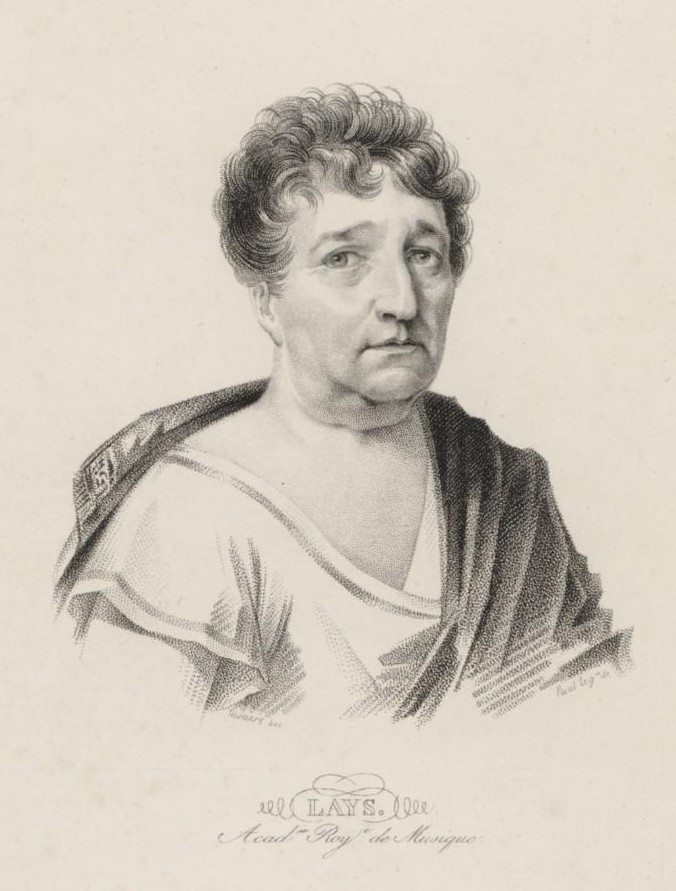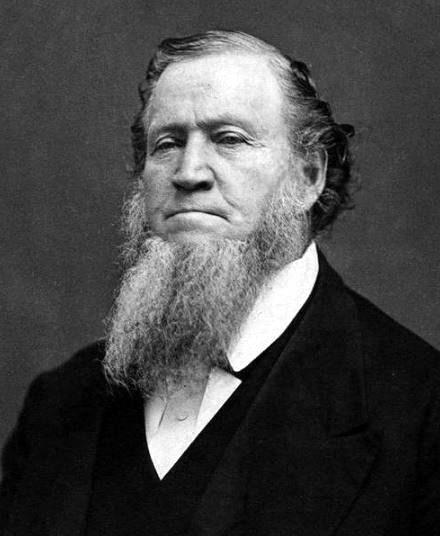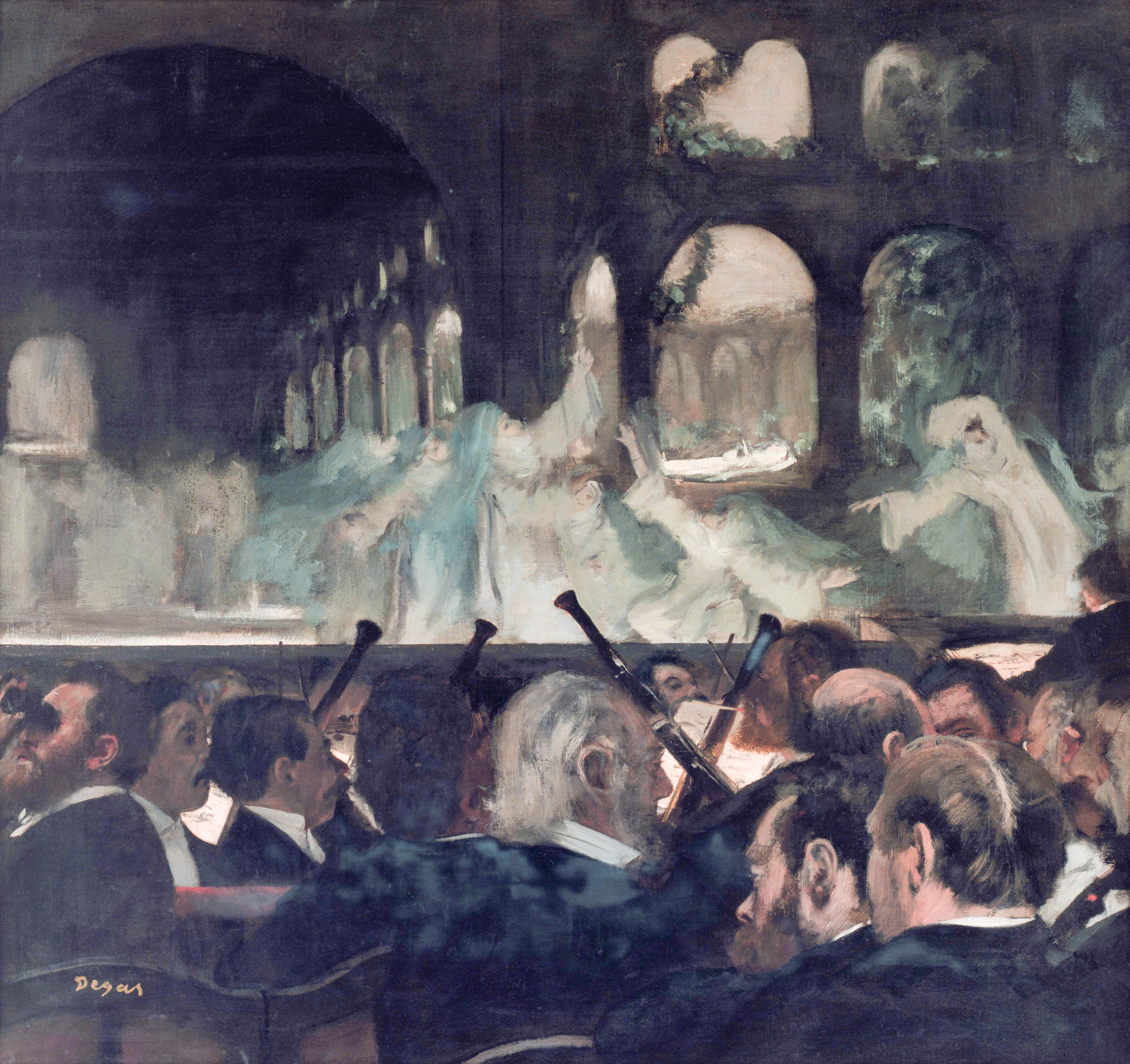|
Ossian, Ou Les Bardes
''Ossian, ou Les bardes'' (English: ''Ossian, or The Bards'') is an opera in five acts by the French composer Jean-François Le Sueur. The libretto, by Alphonse François "Paul" Palat-Dercy and Jacques-Marie Deschamps, is based on the Ossian poems of James Macpherson (specifically the poem "Calthon and Colmal"), which had been translated into French by . Performance history Le Sueur probably began work on the opera as early as 1795. It was first performed at the Paris Opera on 10 July 1804. The premiere was a huge success, especially with Emperor Napoleon, who was a great admirer of the Ossian poems. Napoleon was so enthusiastic, he invited the composer to join him in the imperial box at the third act and the next day he sent Le Sueur a gold casket engraved "The Emperor Napoleon to the author of ''Les bardes''", containing the cross of the Légion d'honneur. The opera received almost 70 performances over the next 12 years. Roles Synopsis The opera is set in an imaginary Scot ... [...More Info...] [...Related Items...] OR: [Wikipedia] [Google] [Baidu] |
Opera
Opera is a form of theatre in which music is a fundamental component and dramatic roles are taken by singers. Such a "work" (the literal translation of the Italian word "opera") is typically a collaboration between a composer and a librettist and incorporates a number of the performing arts, such as acting, scenery, costume, and sometimes dance or ballet. The performance is typically given in an opera house, accompanied by an orchestra or smaller musical ensemble, which since the early 19th century has been led by a conductor. Although musical theatre is closely related to opera, the two are considered to be distinct from one another. Opera is a key part of the Western classical music tradition. Originally understood as an entirely sung piece, in contrast to a play with songs, opera has come to include numerous genres, including some that include spoken dialogue such as '' Singspiel'' and '' Opéra comique''. In traditional number opera, singers employ two styles of ... [...More Info...] [...Related Items...] OR: [Wikipedia] [Google] [Baidu] |
François Lays
François Lay, better known under the stage name Lays (14 February 1758 – 30 March 1831), was a French baritone and tenor opera singer. Originally destined for a career in the church, Lays was recruited by the Paris Opéra in 1779. He soon became a leading member of the company, in spite of quarrels with the management. Lays enthusiastically welcomed the French Revolution and became involved in politics with the encouragement of his friend Bertrand Barère. Barère's downfall led to Lays being imprisoned briefly, but he soon won back the public and secured the patronage of Napoleon, at whose coronation and second wedding he sang. This association with the Emperor caused him trouble when the Bourbon monarchy was restored and Lays's final years were darkened by disputes over his pension, mounting debts, the death of his only son and his wife's illness. After a career spanning more than four decades, he died in poverty. Lays was famous for the beauty of his voice. One of the Op� ... [...More Info...] [...Related Items...] OR: [Wikipedia] [Google] [Baidu] |
Brigham Young University
Brigham Young University (BYU, sometimes referred to colloquially as The Y) is a private research university in Provo, Utah. It was founded in 1875 by religious leader Brigham Young and is sponsored by the Church of Jesus Christ of Latter-day Saints (LDS Church). BYU offers a variety of academic programs including those in the liberal arts, engineering, agriculture, management, physical and mathematical sciences, nursing, and law. It has 186 undergraduate majors, 64 master's programs, and 26 doctoral programs. It is broadly organized into 11 colleges or schools at its main Provo campus, with some colleges and divisions defining their own admission standards. The university also administers two satellite campuses, one in Jerusalem and one in Salt Lake City, while its parent organization the Church Educational System (CES) sponsors sister schools in Hawaii and Idaho. The university is accredited by the Northwest Commission on Colleges and Universities. Almost all BYU students ... [...More Info...] [...Related Items...] OR: [Wikipedia] [Google] [Baidu] |
Amanda Holden (writer)
Amanda Juliet Holden (; 19 January 1948 – 7 September 2021) was a British pianist, librettist, translator, editor and academic teacher. She is known for translating opera librettos to more contemporary English for the English National Opera, and for writing new librettos, especially in collaboration with Brett Dean. She contributed to encyclopedias such as the ''New Penguin Opera Guide''. Life and career Amanda Juliet Warren was born in London, the daughter of Sir Brian Warren and Dame Josephine Barnes. She was educated at Benenden School, and studied at Lady Margaret Hall, Oxford, with Egon Wellesz where she gained a Master of Arts (MA), at Guildhall School of Music and Drama and a MA at the American University, Washington, DC. She also had degrees from the Royal Academy of Music (ARCM and LRAM).Holden /Amanda, ''Who's Who'' (UK), 2012 She first worked as a freelance pianist and accompanist, teacher at the Guildhall School, and therapist from 1973 to 1986. Libret ... [...More Info...] [...Related Items...] OR: [Wikipedia] [Google] [Baidu] |
Hector Berlioz
In Greek mythology, Hector (; grc, Ἕκτωρ, Hektōr, label=none, ) is a character in Homer's Iliad. He was a Trojan prince and the greatest warrior for Troy during the Trojan War. Hector led the Trojans and their allies in the defense of Troy, killing countless Greek warriors. He was ultimately killed in single combat by Achilles, who later dragged his dead body around the city of Troy behind his chariot. Etymology In Greek, is a derivative of the verb ἔχειν ''ékhein'', archaic form * grc, ἕχειν, hékhein, label=none ('to have' or 'to hold'), from Proto-Indo-European *'' seɡ́ʰ-'' ('to hold'). , or as found in Aeolic poetry, is also an epithet of Zeus in his capacity as 'he who holds verything together. Hector's name could thus be taken to mean 'holding fast'. Description Hector was described by the chronicler Malalas in his account of the ''Chronography'' as "dark-skinned, tall, very stoutly built, strong, good nose, wooly-haired, good beard, sq ... [...More Info...] [...Related Items...] OR: [Wikipedia] [Google] [Baidu] |
Grand Opera
Grand opera is a genre of 19th-century opera generally in four or five acts, characterized by large-scale casts and orchestras, and (in their original productions) lavish and spectacular design and stage effects, normally with plots based on or around dramatic historic events. The term is particularly applied (sometimes specifically used in its French language equivalent grand opéra, ) to certain productions of the Paris Opéra from the late 1820s to around 1850; 'grand opéra' has sometimes been used to denote the Paris Opéra itself. The term 'grand opera' is also used in a broader application in respect of contemporary or later works of similar monumental proportions from France, Germany, Italy, and other countries. It may also be used colloquially in an imprecise sense to refer to 'serious opera without spoken dialogue'. Origins Paris at the turn of the 19th century drew in many composers, both French and foreign, and especially those of opera. Several Italians working d ... [...More Info...] [...Related Items...] OR: [Wikipedia] [Google] [Baidu] |
Christoph Willibald Gluck
Christoph Willibald (Ritter von) Gluck (; 2 July 1714 – 15 November 1787) was a composer of Italian and French opera in the early classical period. Born in the Upper Palatinate and raised in Bohemia, both part of the Holy Roman Empire, he gained prominence at the Habsburg court at Vienna. There he brought about the practical reform of opera's dramaturgical practices for which many intellectuals had been campaigning. With a series of radical new works in the 1760s, among them '' Orfeo ed Euridice'' and '' Alceste'', he broke the stranglehold that Metastasian '' opera seria'' had enjoyed for much of the century. Gluck introduced more drama by using orchestral recitative and cutting the usually long da capo aria. His later operas have half the length of a typical baroque opera. Future composers like Mozart, Schubert, Berlioz and Wagner revered Gluck very highly. The strong influence of French opera encouraged Gluck to move to Paris in November 1773. Fusing the traditions ... [...More Info...] [...Related Items...] OR: [Wikipedia] [Google] [Baidu] |
Harp
The harp is a stringed musical instrument that has a number of individual strings running at an angle to its soundboard; the strings are plucked with the fingers. Harps can be made and played in various ways, standing or sitting, and in orchestras or concerts. Its most common form is triangular in shape and made of wood. Some have multiple rows of strings and pedal attachments. Ancient depictions of harps were recorded in Current-day Iraq (Mesopotamia), Iran (Persia), and Egypt, and later in India and China. By medieval times harps had spread across Europe. Harps were found across the Americas where it was a popular folk tradition in some areas. Distinct designs also emerged from the African continent. Harps have symbolic political traditions and are often used in logos, including in Ireland. History Harps have been known since antiquity in Asia, Africa, and Europe, dating back at least as early as 3000 BCE. The instrument had great popularity in Europe during the ... [...More Info...] [...Related Items...] OR: [Wikipedia] [Google] [Baidu] |
Scrim (material)
A scrim is a woven material, either finely woven lightweight fabric widely used in theatre, or a heavy, coarse woven material used for reinforcement in both building and canvasmaking. Light gauzy material A scrim or gauze is often a very light textile made from cotton, or sometimes flax or other materials. It is lightweight and translucent, which means it is often used for making curtains. The fabric can also be used for bookbinding and upholstery. Scrims have seen extensive use in theatre. There are several types used for special effects. The variety typically used for special effects is called ''sharkstooth scrim''. However, in theater a scrim can refer to any such thin screen, and is made out of a wide variety of materials. Sharkstooth scrim is woven and earns its name because the weave resembles a set of triangles that resemble a shark's teeth with openings similar in size to a window screen's. The most common effects that scrim is used for is the 'reveal effect', in whic ... [...More Info...] [...Related Items...] OR: [Wikipedia] [Google] [Baidu] |
Bard
In Celtic cultures, a bard is a professional story teller, verse-maker, music composer, oral historian and genealogist, employed by a patron (such as a monarch or chieftain) to commemorate one or more of the patron's ancestors and to praise the patron's own activities. With the decline of a living bardic tradition in the modern period, the term has loosened to mean a generic minstrel or author (especially a famous one). For example, William Shakespeare and Rabindranath Tagore are respectively known as "the Bard of Avon" (often simply "the Bard") and "the Bard of Bengal". Oxford Dictionary of English, s.v. ''bard'', n.1. In 16th-century Scotland, it turned into a derogatory term for an itinerant musician; nonetheless it was later romanticised by Sir Walter Scott (1771–1832). Etymology The English term ''bard'' is a loan word from the Celtic languages: Gaulish: ''bardo-'' ('bard, poet'), mga, bard and ('bard, poet'), wlm, bardd ('singer, poet'), Middle Breton: ''barz'' ('m ... [...More Info...] [...Related Items...] OR: [Wikipedia] [Google] [Baidu] |
Odin
Odin (; from non, Óðinn, ) is a widely revered Æsir, god in Germanic paganism. Norse mythology, the source of most surviving information about him, associates him with wisdom, healing, death, royalty, the gallows, knowledge, war, battle, victory, sorcery, poetry, frenzy, and the Runes, runic alphabet, and depicts him as the husband of the goddess Frigg. In wider Germanic mythology and paganism, the god was also known in Old English as ', in Old Saxon as , in Old Dutch as ''Wuodan'', in Old Frisian as ''Wêda'', and in Old High German as , all ultimately stemming from the Proto-Germanic language, Proto-Germanic theonym *''Wōðanaz'', meaning 'lord of frenzy', or 'leader of the possessed'. Odin appears as a prominent god throughout the recorded history of Northern Europe, from the Roman occupation of regions of Germania (from BCE) through movement of peoples during the Migration Period (4th to 6th centuries CE) and the Viking Age (8th to 11th centuries CE). In the modern pe ... [...More Info...] [...Related Items...] OR: [Wikipedia] [Google] [Baidu] |
Scandinavia
Scandinavia; Sámi languages: /. ( ) is a subregion#Europe, subregion in Northern Europe, with strong historical, cultural, and linguistic ties between its constituent peoples. In English usage, ''Scandinavia'' most commonly refers to Denmark, Norway, and Sweden. It can sometimes also refer more narrowly to the Scandinavian Peninsula (which excludes Denmark but includes part of Finland), or more broadly to include all of Finland, Iceland, and the Faroe Islands. The geography of the region is varied, from the Norwegian fjords in the west and Scandinavian mountains covering parts of Norway and Sweden, to the low and flat areas of Denmark in the south, as well as archipelagos and lakes in the east. Most of the population in the region live in the more temperate southern regions, with the northern parts having long, cold, winters. The region became notable during the Viking Age, when Scandinavian peoples participated in large scale raiding, conquest, colonization and trading mostl ... [...More Info...] [...Related Items...] OR: [Wikipedia] [Google] [Baidu] |










